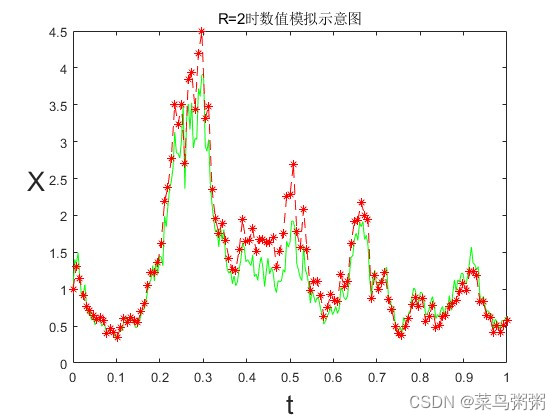随机微分方程数值实验 Euler-Maruyama方法(matlab)
发布时间:2023年12月26日
求解随机微分方程如下:
微分方程的真解为:
Euler-Maruyama方法的数值格式:
程序如下:
randn('state',50)
lambda=1.6;mu=2.3;Xzero=1;
T=1;N=2^8;dt=1/N;
dW=sqrt(dt)*randn(1,N);
W=cumsum(dW);
Xtrue=Xzero*exp((lambda-0.5*mu^2)*(dt:dt:T)+mu*W);
plot([0:dt:T],[Xzero,Xtrue],'g-'),hold on
R=1;Dt=R*dt;L=N/R;
Xem=zeros(1,L);
Xtemp=Xzero;
for j=1:L
Winc=sum(dW(R*(j-1)+1:R*j));
Xtemp=Xtemp+Dt*lambda*Xtemp+mu*Xtemp*Winc;
Xem(j)=Xtemp;
end
plot([0:Dt:T],[Xzero,Xem],'r--*'),hold off
xlabel('t','FontSize',20)
ylabel('X','FontSize',20,'Rotation',0,'HorizontalAlignment','right')
title('R=1时数值模拟示意图')
emerr=abs(Xem(end)-Xtrue(end))% Mean-square and asymptotic stability test for E-M
randn('state',150)
T=15;M=40000;Xzero=1;
ltype={'g-','r--','b-.'};
subplot(211)
lambda=1.6;mu=2.3;
for k=1:3
Dt=2^(1-k);
N=T/Dt;
Xms=zeros(1,N);Xtemp=Xzero*ones(M,1);
for j=1:N
Winc=sqrt(Dt)*randn(M,1);
Xtemp=Xtemp+Dt*lambda*Xtemp+mu*Xtemp.*Winc;
Xms(j)=mean(Xtemp.^2);
end
semilogy([0:Dt:T],[Xzero,Xms],ltype{k},'Linewidth',2),hold on
end
legend('\Delta t=1','\Delta t=1/2','\Delta t=1/4')
title('Mean-Square:\lambda=1.6,\mu=2.3','FontSize',16)
ylabel('E[x^2]','FontSize',12),axis([0,T,1e-20,1e+20]),hold offrandn('state',130)
lambda=1.6;mu=2.3;Xzero=1;
T=1;N=2^8;dt=1/N;
dW=sqrt(dt)*randn(1,N);
W=cumsum(dW);
Xtrue=Xzero*exp((lambda-0.5*mu^2)*(dt:dt:T)+mu*W);
plot([0:dt:T],[Xzero,Xtrue],'g-'),hold on
R=4;Dt=R*dt;L=N/R;
Xem=zeros(1,L);
Xtemp=Xzero;
for j=1:L
Winc=sum(dW(R*(j-1)+1:R*j));
Xtemp=Xtemp+Dt*lambda*Xtemp+mu*Xtemp*Winc;
Xem(j)=Xtemp;
end
plot([0:Dt:T],[Xzero,Xem],'r--*'),hold off
xlabel('t','FontSize',16)
ylabel('X','FontSize',16,'Rotation',0,'HorizontalAlignment','right')
title('R=4,randn(state,130)时数值模拟示意图')
emerr=abs(Xem(end)-Xtrue(end))结果:




文章来源:https://blog.csdn.net/2301_76767110/article/details/135186871
本文来自互联网用户投稿,该文观点仅代表作者本人,不代表本站立场。本站仅提供信息存储空间服务,不拥有所有权,不承担相关法律责任。 如若内容造成侵权/违法违规/事实不符,请联系我的编程经验分享网邮箱:chenni525@qq.com进行投诉反馈,一经查实,立即删除!
本文来自互联网用户投稿,该文观点仅代表作者本人,不代表本站立场。本站仅提供信息存储空间服务,不拥有所有权,不承担相关法律责任。 如若内容造成侵权/违法违规/事实不符,请联系我的编程经验分享网邮箱:chenni525@qq.com进行投诉反馈,一经查实,立即删除!
最新文章
- Python教程
- 深入理解 MySQL 中的 HAVING 关键字和聚合函数
- Qt之QChar编码(1)
- MyBatis入门基础篇
- 用Python脚本实现FFmpeg批量转换
- 模型放置到3D场景中后模型位置与鼠标选中的位置不一致怎么办?
- C++11——可变参数模板
- 【STM32】FLASH闪存
- 众和策略:AI电脑或成新风口 机构圈点投资机会
- vi ~/.bashrc 后如何编辑并退出
- 大数据应用领域:数据驱动一切
- 业务模式画布(Business Model Canvas)
- 金和OA GetAttOut接口存在SQL注入漏洞
- Tableau1 安装&基础知识
- Golang中的深浅拷贝、结构体的拷贝、或可能的深拷贝失败原因